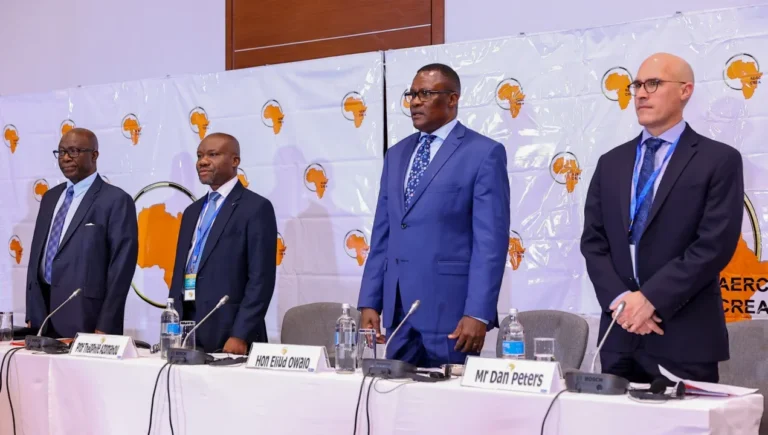The African Economic Research Consortium (AERC) 25th Senior Policy Seminar (SPS) has opened today in Nairobi, Kenya, with calls to facilitate continent-wide unity on information technology and communication avenues to foster growth.
Kenya’s Ministry of Information, Communication and Digital Economy Cabinet Secretary Eliud Owalo, the Chief Guest at the SPS opening ceremony, called for strengthening of capacity-building efforts at the human capital development level to facilitate economic and social growth. Failure to bridge the human capital gap through ICT, Owalo told Economic Policy leaders at the SPS, will negatively affect Africa’s capacity to engage in the fledgling digital economy and slow down the efforts of the continent to achieve its full potential.
“Our deliberation in this seminar must acknowledge that we must answer how Africa will engage its way to navigate and move forward. We must think of how we will fit Africa into the global agenda. We must plan for digital skills for an innovative online economy. Citizens must be able and be made conscious of digital identity that will make them relevant to global spaces. We must always think of digital security; it is crucial,” he said.
The two-day conference is an accumulation of three-year research that was funded by the Bill and Melinda Gates Foundation (BMGF) to support research into human capital formation in seven countries in Africa, facilitate the dissemination of that research to policymakers and the public, and strengthen the capacity of African policy research institutions.
The hybrid conference featured local and international economic and public policymakers with eminent researchers presenting research papers on the subject of human capital development.
Human capital is the economic value of a person’s abilities and the qualities of their labor that influence productivity. It is critical for inclusive growth and shared prosperity in Africa. Investment in human beings for improved social and economic outcomes in future – through education and training, learning and experience, or health interventions – is vital in shaping future income and productivity. Therefore, developing human capital in Africa requires a massive and coordinated effort to strengthen the quantity, efficiency, and impact of investments in people. There is a need to facilitate regional and country-owned policy reforms, action plans and cross-country learning in four key areas namely: expanding effective government investment in social services; introducing reforms and innovation to improve service delivery; committing to equity and inclusiveness and addressing fertility and gender issues to harness a demographic dividend.
Mr. Dan Peters, Advisor, Global Policy & Advocacy BMGF, had this to say, “Africa has enormous potential in this century due to its expansion. Countries need to invest wisely to produce better health, educate and skills for human capital. We need to ensure that everyone lives a healthy and productive life. We have the fastest growing and youthful population in the world today but we have not planned our development to align to this. I am glad we are able to support AERC and its partners with projects such as this.”
“The role that the government plays is vital because it requires massive and coordinated efforts and the best starting point for this is through facilitation of regional policies in key areas such as expansive government social activities, reforms and innovations, service deliveries and committing to equity. Our role as AERC is to build overall capacity for economies in Africa. But these are made better by appropriate policy-oriented research in the continent, hence our annual seminars like todays where we get to address real events to Africa’s policy events,” said AERC Acting Executive Director Prof. Théophile Azomahou.
AERC senior policy seminars are forums designed specifically to bring together senior policymakers from sub-Saharan African countries to exchange experiences and deliberate on topical issues pertaining to the sustainable development of their economies. Participants in these seminars are drawn from the highest levels of government, including the presidency, ministers, governors of central banks, heads of civil services, permanent secretaries and heads of government agencies and parastatals.

